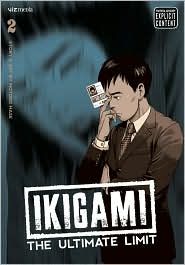Motoro Mase's Ikigami is an adult version of Death Note, where death is meted out not by a sociopath with a god-complex, but randomly by the government to ensure social order. It's a great concept that makes for some very dark, and sometimes even inspiring, storytelling.
Once again, protagonist Fujimoto is charged with notifying citizens that they will die in 24 hours -- every individual will experience a different last day on earth, but it is Fujimoto who is slowly but surely changing thanks to his role in the process. Fujimoto's primary task is to make sure that individuals receive their death note in time and that they don't make too much of a mess on their way out. It's a pretty craptacular job and it is incredibly disturbing to see this job is slowly erode Fujimoto's integrity and spirit. Watching him contemplate the file of someone who is about to learn they are going to die in a day while simultaneously thinking about possible late fees for his movie rental is a pretty devastating indictment of humanity. One can see how the institutionalization of a completely innocent societal scapegoat would eventually become part of the background of everyday life. Why bother to question when there is nothing one can do to change the system? Whether or not the system does what it claims to do -- create "docile" citizenry -- the very existence of the system is more likely to ground people down by its very nature. And of course, denial is a very powerful force...if your probability of dying is based on a 1 in a thousand chance you were injected with a poison capsule as a child, it becomes somewhat easy to get through life constantly repeating the mantra, "It can't possibly happen to me."
Importantly, this volume -- like the first -- is comprised of lengthy case studies of people whose number, as it were, gets called. While the first volume's case studies emphasized the experience of the individual who learns of their death, this volume seemed to branch out to focus on the various ways in which the effect of a single person's death would ripple out to their loved ones and their local community. Not all stories are depressing, surprisingly, but since they all have the same ending it is a question of how much variety Mase can interject into the story of a person's last day on earth. In a way, it is the title's case studies that currently hint at possibilities of redemption, but when paired with Fujimoto's thankless and possibly endless task, one wonders when the story will take a turn for revolt, if not outright revolution, against the system. Right now the premise is intriguing enough to carry the story, even if I've become a little impatient waiting for Fujimoto to wake up to the horror he both lives and perpetrates.
Review copy provided by Viz.


